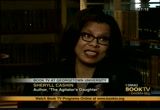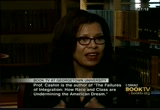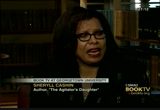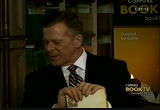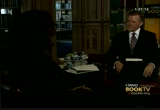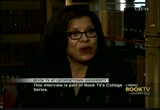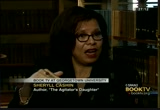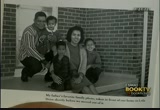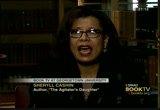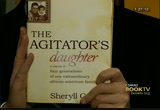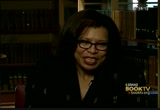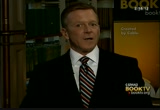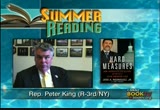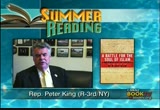tv Book TV CSPAN September 3, 2012 8:30am-8:45am EDT
8:30 am
in the near future on booktv and on booktv.org. and now a few interviews from booktv's recent visit to georgetown university here in the nation's capital. we talked with sheryll cashin about her book, "the agitator's daughter." this is about 15 minutes. >> the agitator's daughter is the name of the book, and sheryll cashin is the author, she's also a professor of law here at georgetown university. who's the agitator? >> my dad, dr. john cashin jr., who may he rest in peace, he just passed this last, past year, yeah. >> what kind of an agitator was he? >> well, um, my dad founded an independent democratic party in alabama at a time when the
8:31 am
regular democratic party was dominated by george wallace and the dixiecrats. and despite being a dentist and a two-time valedictorian, his advocation was agitation, and he poured hundreds of thousands of dollars of his own money -- this is in the '60s, mind you, '60s and early '70s -- into this political party so that alabamians could vote for lyndon johnson rather than george wallace and that the hundreds of thousands of newly-registered black voters would have people to vote for. could not just vote, but also run for office. and so that was his life's work, and he was very much committed to recapturing the greatness of african-americans in the terms of political participation. he was very steeped in the era of reconstruction because his grandfather had been a
8:32 am
reconstruction legislator, and he grew up hearing about his grandfather, grandpa herschel, while he was coming of age in jim crow, and it radicalized him to be living under jim crow in alabama while hearing about the fact that black people used to actually have political power and be in office including his own family. >> well, who was herschel cashin? >> that was my great grandfather. handsome man, isn't he? [laughter] he was in our family lore, herschel cashin was the first black lawyer in the state of alabama and the architect of reconstruction, you know? i grew up listening to my father repeat this over and over, you know, as a teenager my eyes would roll. and in this book i go off in search of the source of my father's passions, and i find out that the outlines of the lore are there, but he was admitted to the alabama bar in 1878 -- >> to the alabama bar? >> to the alabama bar.
8:33 am
not the first, but the fourth colored lawyer in the state, and he did serve in reconstruction, during reconstruction, served two terms in the alabama legislature -- >> as a republican. >> as a radical republican. my father always made it clear, as a radical republican. [laughter] but he wasn't the architect because by the time he got elected, reconstruction was already closing down. but my great grandfather, the gentleman in the picture, for the next 40 years never stopped giving up on this idea that people of color had a rightful mace if politics. so he cometted to be active in national republican politics, attended four national republican conventions and raised a family, and my father grew up hearing about him and was determined to as a matter of family honor restore black people to their rightful place in politics in alabama.
8:34 am
that was what my father was all about. >> sheryll cashin, why did you write about your family? what, what made you take it this far? >> well, i got tired of hearing my father say he was going to write a book, you know? i just wanted to say, well, excuse my french, but dammit, if you're not going to write this book -- i was terrified that this incredible lore would die with him. so in my mid 40s, early 40s i should say, i finally just got tired of hearing him talk about, and it just took out a tape recorder and started interviewing him. i wanted to know everything he knew and be sure it didn't get lost. i started interviewing him about what he knew about the family, but also about this political party and everything he did. and it took on a life of it own, and i started researching, um, you know, how much of this lore was true, and it just became an obsession. >> what did you find as far as
8:35 am
how truthful the lore was? >> well, this was -- be careful what you wish for, you know? go o off in search of your family history, you'll find that some things are true and some are not. one of the chief parts of our lore was that we descended from a benever leapt irishman -- benevolent irishman who was never a slave owner -- >> a white man? >> a white man. this guy john cashin and his brother james came over to the u.s. during the potato famine and that one was a slave owner and one was not, and we descended from the benevolent, non-slave owner. not true. we did descend from this guy, john cashin, but inconveniently, he was a slave owner. and not only was he a slave owner, the father of my great grandfather -- >> herschel's father. >> herschel's father. that guy's father who was also named john was one of the more
8:36 am
prominent slave owners in augusta. so here i have to contend with not only did i descend from slavery, but, you know, i descended from wealth, considerable wealth born of slavery, and i could tie my family's history of relative advantage, you know, four generations of educated people. my great grandfather was, had a classical education in philadelphia at the institute for colored youth and became a lawyer. i can tie that to wealth born of slavery which was new in the revelation. and i reconciled myself to that history by what my great grandfather chose to do with that. he chose to go back to the south which he didn't have to, and he chose to work for the uplift of people of color. and he chose to identify with people of color when, in fact, several of his siblings were
8:37 am
pale enough to pass, and they did pass. so he was a bit of an agitator as well, so that was one thing that i discovered. >> professor cashin, what was your childhood like in huntsville, alabama? >> oh, i had an incredible childhood almost from birth. my mother, joan carpenter cashin, took me with her in her arms to a sit-in in april of 1962. i was four months old. she gets herself arrested with me in her arms, and that event was a turning point in the sit-in movement in huntsville, alabama. and within a few months of that event, they had negotiated a nonviolent desegregation of public accommodations in huntsville two full years before the civil rights act, before the water hoses in the birmingham.
8:38 am
>> did it help that huntsville had, was an educated city, that it was in northern alabama? did that make any differences? >> what helped, i think, more than anything was that huntsville had tied its fate to the space industry. and there were, you know, westerner von braun was already there, a lot of people, a lot of engineers and scientists had descended on alabama, and the city, um, wanted to dissociate itself from the rabid, racist image of the rest of the state, and that helped them to negotiate this quietly. so, yeah. from the beginning i have memories of -- so my participants were civil -- parents were civil rights activists, and after the civil rights act passes and the voting rights, then they turned to politics. i grew up licking ndpa stamps, that was the party, the national democratic party -- i have
8:39 am
memories, my father ran for governor against george wallace in 1970, and i just have these memories of my summers being taken all around the state, particularly the black belt of the state, those counties that were the center of the plantation economy during the antibell lumbar era, not surprisingly 100 years later where all the black votes were. and it felt like particularly during that election in 1970, it felt like i had been carried to every black church in the black belt, you know? and i watched my father give this stump speech over and over and over again invoking frederick douglass, that famous line those who profess to deprecate agitation are like the, you know, people who want the crops without plowing up the ground. and that's where the line comes from. frederick douglass, the title, the agitator's daughter, frederick douglass was my father's hero. he was always quoting him.
8:40 am
but when he was on the campaign trail in the black belt speaking to these dirt poor sharecroppers trying to give them a reason to register to vote and go to the poll, he would always invoke douglass and say, you know, don't sit around waiting for other people to do right by grow. as frederick douglass says, go forth and demand your power at the ballot box. >> sheryll cashin, what do you teach here at georgetown? >> i'm a professor of law. i teach a legal history cows called -- course called race in american law which covers most of the major race cases decided by the supreme court. i also teach constitutional law and administrative law and sometimes property. sometimes local government law. >> when you approach public affairs or when you sent this manuscript to a publisher, what was the answer back from public affairs?
8:41 am
why were they interested in this story? >> well, fortunately, i already had a prior relationship with them. public affairs published my first be book which was a book about, a book titled "the failures of integration," but it was about why we still struggle to be an integrated society. so i had a relationship with them. and i sent a proposal to them via my agent, and they were familiar with me because of the first book and promoting the first book. and, um, i think they knew, they knew that as hard as it is to get attention for a memoir if you're not famous, i think they knew that i was a fairly tenacious person, and they also found the story compelling. so thank you, public affairs. [laughter] >> just a short conversation with georgetown professor sheryll cashin about her second book, "the agitator's daughter: a memoir of four generations of one extraordinary african-american family." by the way, booktv covered
8:42 am
professor cashin earlier on this book, and it's about an hour in length. you can go to c-span -- sorry, booktv.org. just go up to the search function up in the upper left-hand corner and type in her name, and you can watch the entire hour. thanks for being with us. every weekend booktv offers 48 hours of programming focused on nonfiction authors and books. watch it here on c-span2. >> what are you reading this summer? booktv wants to know. >> as chairman of the homeland security committee and sort of now going over into my personal reading, so i'm reading a number of books involving islamic terrorism, the american response to 9/11, what we're doing as far as wars in this afghanistan and iraq. the main book i read was hard measures by jose rodriguez. he was, basically, head of the team that put together the
8:43 am
interrogation methods after september 11th including waterboarding which has been criticized but which i think was effective and did the job. a very, very well-written book. also the art of intelligence by hank compton. he's with cia, but he was orchestrating, managing, directing the war in afghanistan after 9/11. and, again, a fascinating read. kill or capture by daniel klandman, this follows the obama administration as far as what they're doing in iraq and afghanistan, how their policies are being pursued and shows a side of the president which indicates that his policies are not that different in many cases from president bush's. also peter bergin's book, the hunt for bin laden, which i'm really just starting now. it details the ten-year manhunt for bin laden which, of course, ended very successfully last may when he was killed.
8:44 am
and then dr. johnson who's been a witness before on my committee has a book called a battle for the soul of islam which is an american muslim's attempt to focus american muslims on the war against al-qaeda, against islamic extremism. and can then another book which is world affairs, it's berlin 1961 by frederick frederick kemi was in college at that time, and it describes the behind-the-scenes destruction of the berlin wall -- construction of the berlin wall, and it's interesting to compare those times with what's happening today. and finally, a complicated man, a history of bill clinton. i was mentioned -- i was interviewed for the book, so i guess i'm reading it because i'm in the book. again, that was the first president i served under in congress was bill clinton, and
172 Views
IN COLLECTIONS
CSPAN2 Television Archive
Television Archive  Television Archive News Search Service
Television Archive News Search Service 
Uploaded by TV Archive on

 Live Music Archive
Live Music Archive Librivox Free Audio
Librivox Free Audio Metropolitan Museum
Metropolitan Museum Cleveland Museum of Art
Cleveland Museum of Art Internet Arcade
Internet Arcade Console Living Room
Console Living Room Books to Borrow
Books to Borrow Open Library
Open Library TV News
TV News Understanding 9/11
Understanding 9/11
